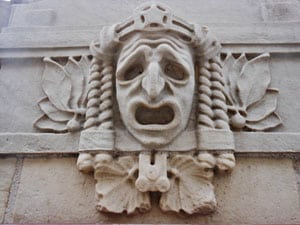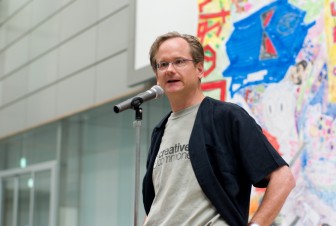Richard C. Holbrooke, the Obama administration’s special envoy for Afghanistan and Pakistan since 2009 and a diplomatic troubleshooter died on the evening of December 13 in Washington. He was 69and lived in Manhattan.
BusinessWeek‘s obit for Ambassador Richard C. Holbrooke referred to him as a “denizen of Wall Street and the nonprofit community during Republican George W. Bush’s eight years as president.” Holbrooke’s service with and to the nonprofit sector preceded the Bush Administration – he worked for every Democratic president since the late 1960s and oversaw the negotiations that ended the war in Bosnia – and continued through to his work with the Obama Administration as Secretary Hillary Clinton’s special envoy.
I knew about Holbrooke’s work and for a year watched it close-up.
I met this brilliant and irascible man in 1972 when he was editor of Foreign Policymagazine and I was one of the anti-war activists working for the Student Advisory Committee on International Affairs; both of us were housed at the Carnegie Endowment for International Affairs. Trust me, although he was only 9 years older, he probably saw me as a scruffy hirsute kid, just out of college, a full-time protester against the U.S. war in Viet Nam. Meanwhile, I viewed him, Tony Lake (currently head of UNICEF and formerly Bill Clinton’s National Security Advisor), and others at the Carnegie Endowment as the genius components of a foreign policy that would replace the Nixon/Kissinger establishment.
BusinessWeeksaid that Holbrooke was known for his “vast intellect [and] an ego to match,” qualities that will be sorely missed by Secretary Clinton (Holbrooke was also her foreign policy advisor during the 2008 primaries). But was he some sort of nonprofit denizen? Holbrooke was connected to a number of nonprofits through formal board and advisory board roles over the years, most of them connected to his international affairs interests.
Some of his nonprofit roles, however, were surprisingly eclectic and perhaps revealing about the man who represented USAID in the Mekong Delta, directed the Peace Corps in Morocco, edited Foreign Policy, wrote a volume of the Pentagon Papers, led the normalization of diplomatic ties with China under President Carter in 1978, served as ambassador to Germany and later ambassador to the United Nations, and negotiated the Dayton Peace Accords ending the war in the Balkans.
On the international side, Holbrooke worked with distinguished and influential nonprofits, mostly during interstices of his career when he wasn’t representing the U.S. as a diplomat:
· He was an honorary trustee of the Dayton Peace Museum along with fellow honorary members Willie Nelson, Dick Gregory, and Martin Sheen.
· Like others of his stature, he was on the board of the Council on Foreign Relations and served on the advisory board of the National Security Network.
· Based on his ambassadorial stint in Germany, he was the founding chairman of the American Academy in Berlin.
Sign up for our free newsletters
Subscribe to NPQ's newsletters to have our top stories delivered directly to your inbox.
By signing up, you agree to our privacy policy and terms of use, and to receive messages from NPQ and our partners.
· He was widely credited for taking over a “moribund” NGO and turning it into the Global Business Coalition on HIV/AIDS, TB, and Malaria and also served on the Transatlantic Partners Against AIDS board.
· He served on the board of the Malaria No More Fund, which emerged from a White House summit sponsored by President George W. Bush.
· Based on his extensive work in Vietnam and China, he served as chairman of the Asia Society.
· Despite his political roles advising the campaigns of John Kerry and Hillary Clinton, Holbrooke served on the boards of bipartisan international relations groups such as the Partnership for a Secure America and the National Endowment for Democracy.
· He was on the board of the International Rescue Committee and won the 1995 IRC Freedom Award (previous winners included Lech Walesa, Winston Churchill, Willy Brandt, Vaclav Havel, and Aung San Suu Kyi, though also in 2002 Holbrooke’s recent nemesis, Hamid Karzai).
Additional international affairs nonprofits include a host of Germany- and China-related groups, tapping Holbrooke’s State Department service in these regions.
These are the foreign policy establishment organizations that would have suffered intellectual and analytical lacunae had Holbrooke not been recruited to their governing or advisory bodies. But Holbrooke also had other interests in the nonprofit sector. He served for a time on the board of the Telluride Foundation, where General H. Norman Schwarzkopf and actress Susan St. James currently sit as board members), supporting community organizations and the arts in the Telluride resort area of Colorado.
Worth noting, however, is a completely distinctive board role that Holbrooke held. He belonged to the board of directors of the American Museum of Natural History in New York and apparently the museum’s Planetarium Authority. Certainly the museum’s board is comprised of of heavyweight political and business types, but Holbrooke’s presence on the planetarium’s governing board sounds like the heavens might have been an interest of the ambassador’s. Maybe if Holbrooke hadn’t died so suddenly and tragically, he might have been watching the Geminid meteor shower on the NASA website’s feed last week.
The idea that Holbrooke was a “denizen” of nonprofits makes it sound like he was something of a squatter, a passing occupant, like he was also a denizen of the State Department. It seems to us that his role in these nonprofits, like his role in the government, has been one of leadership and vision. Had he even known that I was down the hall at Carnegie, he wouldn’t have taken much note of the little workshops my group was conducting around the country, trying to demonstrate the domestic implications of U.S. foreign policy. But from that point until today, I knew who Richard Holbrooke was.
Holbrooke worked up until the time of his death. He was taken to hospital after becoming ill in a meeting with Secretary Clinton. After two surgeries to repair a torn aorta Holbrooke succumbed to complications from surgery in a Washington hospital.













